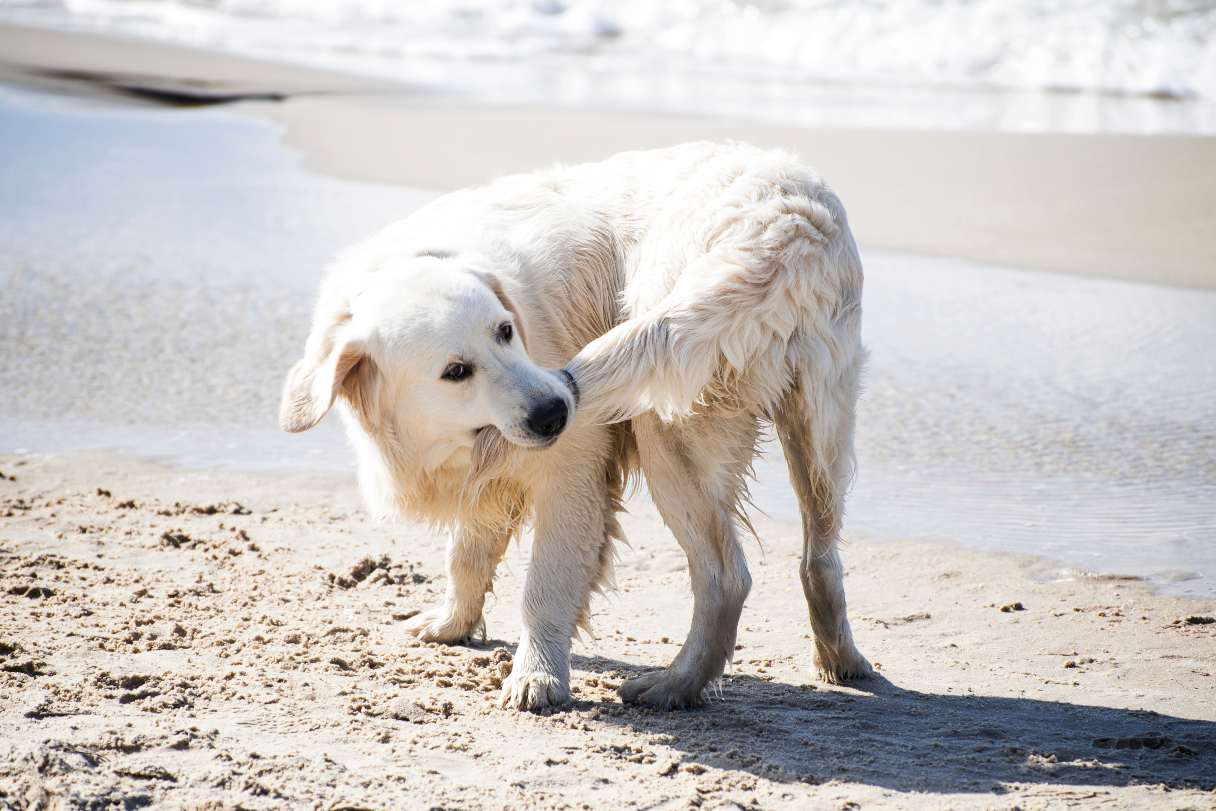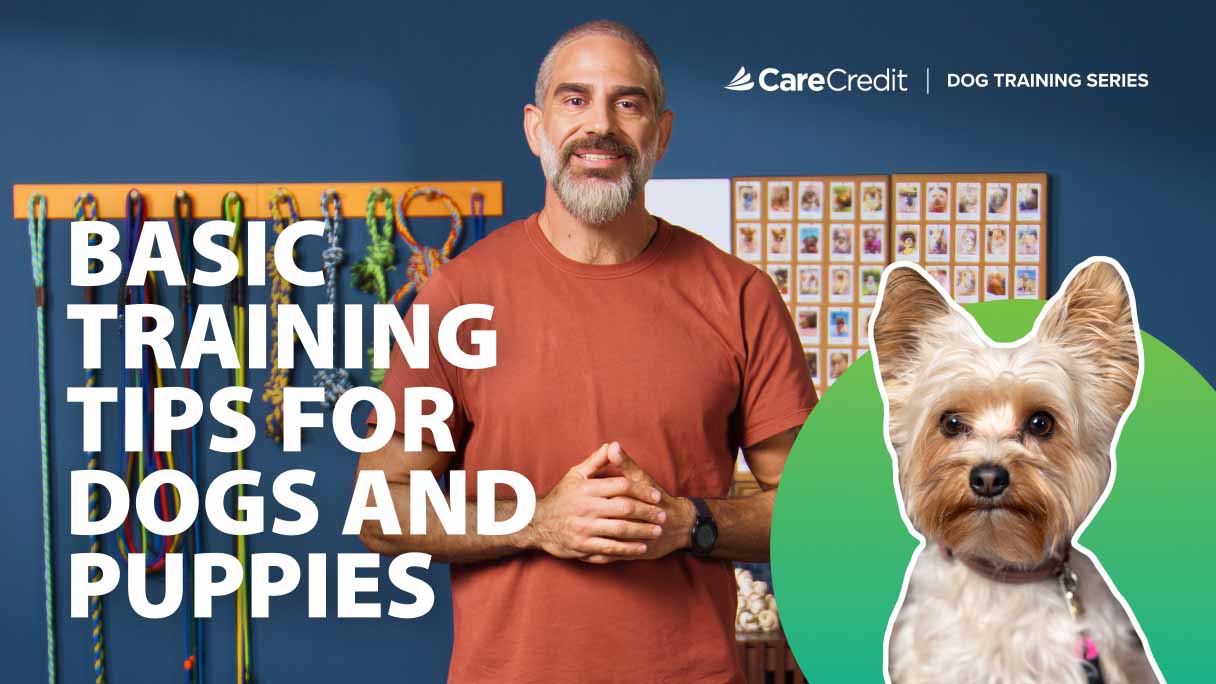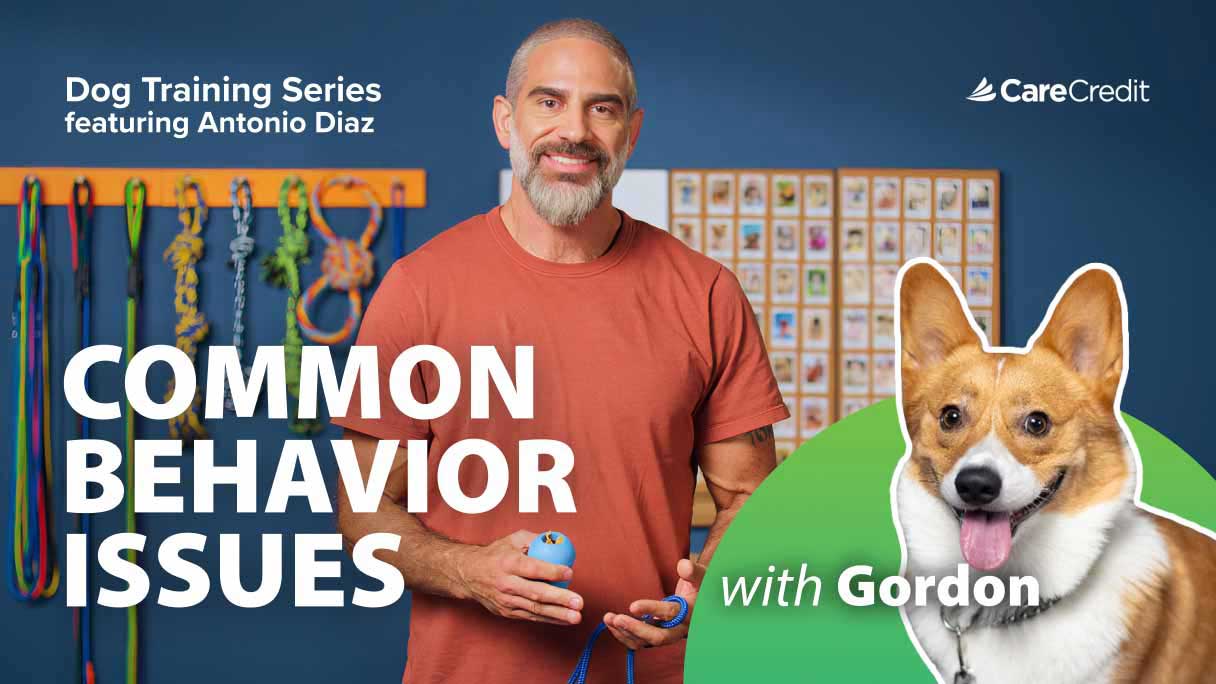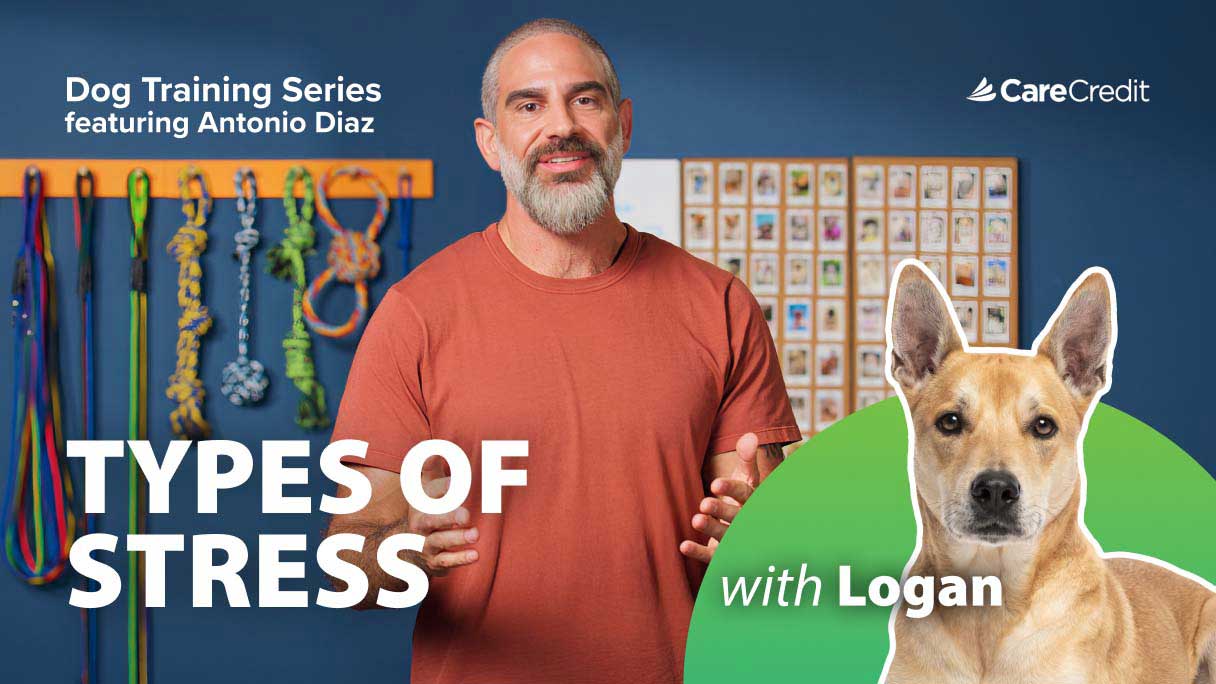Let's face it: Dogs are weird. They do a lot of strange things that can mystify their humans. But for all of their odd, goofy and downright disgusting habits, somehow that just makes us love them all the more.
Understanding the why behind your dog's weird behavior can give you insight into their mental state, and in some cases might even tip you off that something's not quite right with their health. Here are explanations for 21 weird dog behaviors so you can know your dog better, know what's safe to ignore and know when you should see a vet.
1. Chasing Their Tails
Has your pup ever gone after their tail like they didn't know it was part of their body? Some dogs chase their tails when they're bored and need more mental stimulation or physical activity. Puppies might also chase their tails out of curiosity as they gain awareness of their bodies.1
But tail chasing can also be a sign that something's wrong. In older dogs, it could be a sign of declining cognitive function, especially if it's a new behavior.1 And obsessive or repetitive tail chasing could be a symptom of an OCD-like disorder called Canine Compulsive Disorder (CCD).2
If your dog chases their tail so frequently that they can't relax or it appears to cause them stress, or if it's a new behavior that started suddenly, you should mention this to your veterinarian.
2. Turning in Circles
While it's normal for dogs to turn in circles when they're bedding down or getting ready to poop, it's not otherwise typical dog behavior. Dogs who turn or walk in circles for no apparent reason might have a neurological issue. Causes of circling can include:3
- A brain tumor
- Fluid buildup in the brain
- Inflammation of the brain
- Stroke
If your dog keeps going in circles for no apparent reason, you should take them to the vet.
3. Humping
You'd expect an unneutered male dog to mount every female in sight. But what about when you look down to find your adorable Chihuahua humping your grandmother's ankle? As embarrassing as this may be, humping is normal behavior for all dogs: male, female, spayed, neutered or still intact. There are a few reasons for this:4
- They're establishing dominance.
- They're overstimulated.
- They're stressed.
- They're just turned on.
- They have a medical issue.
When humping is accompanied by your dog licking or chewing themselves, this could indicate a health condition like an infection, or prostate problems in male dogs. So if humping is a problem, it's a good idea to have your pup checked out by a vet before tackling the behavior. Once medical issues are ruled out, to get them to stop, simply call their name to get their attention and then redirect them into another activity.4
4. Sniffing Butts
Imagine if humans greeted one another by sniffing each other's rear ends. As bizarre as this image may be, it's perfectly normal social etiquette for dogs. In the same way you can tell a lot about someone by their handshake, dogs can learn a lot about each other by sniffing pheromones that are released by anal glands. Those pheromones contain a dog's ID information, and the 150 million scent receptors in your dog's nose know how to decode that info.5
5. Rolling in Gross Things
Your dirty underwear. The garbage. A dead squirrel carcass. Poop. There's really no limit to the smelly and disgusting things your dog will gleefully roll around in.
There are two theories as to why dogs roll in stinky things, based on behaviors observed in their wolf cousins:6
- They want to mask their scent so their prey won't smell them coming.
- They want to collect interesting scents to bring back to their pack.
When it comes to stealing your underwear to roll in it, there might be one other explanation: Your dog may simply want to cover themselves in your pheromones in order to feel closer to you.7 Icky, but kind of sweet.
6. Eating Poop
There are few things dogs do that can make you gag worse than eating poop. But rest assured, this is fairly normal dog behavior. One in four dogs seem to mistake poop nuggets for Tootsie Rolls at least once in their lifetime, and 1 in 6 make a regular habit out of it.8
But why do dogs eat poop? There are a number of possible reasons, including:8
- Internal parasites
- Endocrine disorders
- Nutritional deficiencies
- Stress or anxiety
- Attention seeking
- Mistaking it for actual food
- Curiosity
Sometimes, dogs keep eating poop simply because they like the taste or texture. But if this is a habit for your dog, you should get them checked out by your vet to make sure this behavior isn't triggered by health problems.8
7. Eating Vomit
OK, so maybe this is more gag-inducing than poop eating. Dogs are so notorious for this behavior that it's even mentioned in the Bible. But why do dogs eat vomit?
Simply put, it's a second chance to enjoy their food. As thoroughly disgusting as that might seem to your delicate human sensibilities, your dog's regurgitated stomach contents look and smell just as appetizing as it did before they ate it. And it's not just their own vomit, either, which you already know if you've ever had to race your dog to pick up cat puke before they could gobble it up.9
8. Getting the Zoomies
You might affectionately refer to those times when your dog races around the living room or the backyard as “zoomies," but they actually have a technical name: FRAPs, which stands for "frenetic random activity periods."10
This is exactly what it sounds like. Dogs get a sudden burst of pent-up energy that they have to expel. It happens most often with young dogs and those who've been cooped up inside all day, but it can also be triggered by playtime, being overstimulated or even pooping.10 Whatever the reason, it's fun to watch, and zoomies sound like a much more fitting name for it.
9. Licking You
Those sweet, slobbery doggy kisses might not actually be so sweet. Nobody's sure why dogs like to lick their favorite people, but a couple of theories could provide an explanation:11
- They want to stimulate you to regurgitate your food for them. This is based on observation of the puppies of wild canids, who lick their mother's face for just this reason after she returns from a hunt.
- They like the way you taste. Your skin is a salty snack.
But licking as a sign of affection isn't ruled out. Some wild canids lick fellow pack members as a greeting and to welcome them back to the pack. So those wet kisses could really just mean that your pooch is happy to see you.11
10. Butt Dragging
It might look funny when your dog scoots their booty across the floor, but it's no laughing matter for your pooch. While butt dragging could simply mean your dog is itchy back there or that “things" didn't come out cleanly, it could also indicate a more serious problem, such as internal parasites or clogged anal glands. If your dog gives repeat performances of their booty-scooting boogie, it's time to see a vet.12
11. Digging Holes
Digging holes is classical dog behavior, although some breeds are more prone to digging than others. Terriers, for instance, were bred to hunt small prey like rats and moles, and may go on a digging frenzy when they sense something moving underground.13
But hunting instincts aren't the only reason dogs dig holes. Other reasons might include:13
- They're bored and digging is fun.
- They want to lie in the dirt to cool off.
- They want to escape under the fence.
- They want to bury a treat or toy for safekeeping.
12. Reverse Sneezing
If your dog suddenly sucks air in through their nose, making a loud snorting sound, you've caught them in a reverse sneeze. Like a regular sneeze, this is an involuntary reflex. It happens when something irritates the nasal or pharyngeal passages or the sinuses, causing the dog to forcefully breathe in through the nose to dislodge it.14
Reverse sneezing can happen to all dogs on occasion, but it's more likely to happen regularly with small dogs and short-nosed or flat-faced dogs like bulldogs and shih tzus.14
13. Kicking After Pooping
Does your pup aggressively scratch the ground with their back feet after taking a poop? It might seem like they're trying — and failing — to cover it up. But really, they're marking their territory.15
You might think that the poop itself would suffice to let other dogs know they've been there. But dogs' paws contain scent glands full of pheromones that provide other dogs a lot more information than their stinky poop can convey.15
14. Barking, Whining and Running in Their Sleep
Dogs have a tendency to act out their dreams when they sleep. This can result in cute and comical behavior, like huffing, barking, whining, tail wagging and even moving their legs as if they're running, all while sound asleep. If you look closely at their eyes, you'll likely notice rapid eye movements that indicate they're in the dream stage of their sleep cycle.16 It's normal behavior, so let your dog keep sleeping, fire up the video camera and enjoy the show.
15. Eating Stuff That Isn't Food
Poop and vomit aren't the only weird things dogs like to eat. If you've ever had to tell your dog “drop it!" as they try to gobble up rocks, dirt, trash, dirty socks or any number of other nonfood items, you're not alone. Pica — a psychological condition behind compulsively ingesting things that aren't food — is common to dogs, and may be a symptom of CCD.17
This isn't always the case, though. Either way, if your dog makes a habit of devouring things that aren't food, it's a good idea to consult your vet about possible underlying health issues as well as ways to get them to stop before they hurt themselves.17
16. Snapping at Invisible Flies
If your dog occasionally takes a bite at the air, it could be that they're actually going after a fly or a gnat that you simply don't see. But doing this repeatedly might be the result of a partial seizure, though that's not necessarily the case. There is some evidence that gastrointestinal issues could cause some dogs to engage in this fly-biting behavior.18 Either way, if you notice your dog doing this on a regular basis, you should have them checked out by a vet.
17. Grinning
Have you ever been approached by a dog who was baring their teeth while simultaneously wiggling their butt at you? This can be a little disconcerting, but it's a friendly gesture known as a submissive grin. Some dogs “smile" like this to both humans and other dogs in order to convey that they're not a threat. But watch for that happy wiggle accompanying those bare teeth. Without the wiggle, that "grin" is probably actually a snarl warning you to keep away.19
18. Turning in Circles Before Lying Down
It's hard to say whether turning in circles before they lie down — and sometimes scratching or digging at their chosen slumber spot — is an endearing dog behavior or just an irritating one. But it's definitely one of their more mystifying habits. Why do dogs do this? Nobody knows for sure, but there are a few theories:20
- It's a holdover from their wild ancestors, who needed to tamp down grass or soften dirt to create a soft bed.
- It's a self-preservation instinct that compels them to circle so they can examine their surroundings for potential threats and make sure they're lying upwind of any predators.
- Circling is a way to mark their spot with their paw scent glands. In wild dog packs, this lets other pack members know a dog has claimed a certain spot.
19. Kicking Their Leg When You Scratch Their Belly
Dogs have an involuntary reflex that causes them to start scratching with their hind legs when certain nerve endings are stimulated. This can happen when they're stimulated by fleas, bugs or human fingers. It's usually a response to something irritating, so the jury's out as to whether or not dogs enjoy it when you scratch that sweet spot that makes their leg shake. If your dog squirms to shift position or tries to get away, that probably means they don't like it and you should stop.21
20. Hiding Their Stuff
As pack animals, dogs in the wild are often expected to share good things they find with the rest of the pack. Even domesticated dogs may have to share food and toys with other pets. But sometimes dogs just want to keep their stuff to themselves, so they hide it. They may stash it in a hiding spot somewhere in the house, or they might even take it outside and bury it.22
This could be a sign of anxiety, especially in multi-pet households where dogs may be used to having their treats or favorite toys stolen by other dogs. And hiding treats or kibble for later could mean you're giving your dog too much food. But generally, guarding resources through hiding is a natural instinct that can help your pup feel more secure.22
21. Eating Grass
Have you ever wondered why your dog sees the lawn as one giant snack? People have been scratching their heads over this canine culinary mystery for ages. There are several different theories as to why dogs eat grass but no one truly knows. Although it's generally not a cause for concern, it might mean your dog is missing nutrients in their diet or that they have an upset stomach.23 If that's not the case and all is well, we can be grateful they prefer grass to our shoes.
CareCredit Credit Card Financing for Dogs
Taking good care of your pet's well-being from nose to tail is essential. Make sure to stay up to date on their regular checkups at the vet to help keep your pet happy and healthy for a lifetime of love. You can use your CareCredit credit card for pet care throughout the year for routine veterinary services as well as emergencies and surgeries.* Use our Acceptance Locator to find a veterinarian near you that accepts CareCredit.
CareCredit is there for you and your pet every step of the way; continue your wellness journey by downloading the CareCredit Mobile App to manage your account, find a provider on the go and easily access the Well U blog for more great articles, podcasts and videos.
In addition to pet care, you can also use your CareCredit credit card for dentistry, cosmetic, vision, hearing, health systems, dermatology, pharmacy purchases, spa treatments and so much more within the CareCredit network. How will you invest in your health and wellness next?
Author Bio
Jean Marie Bauhaus is a freelance writer and novelist who has been writing pet content since 2013. Her work has appeared on Forbes.com, Hill's Pet, Chewy, AKC.org and more.








